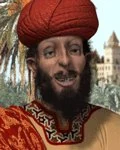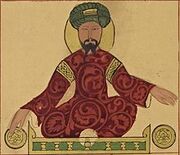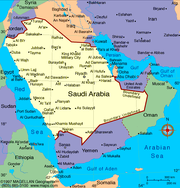
Islam is a major Abrahamic religion, as well as the second-largest religion on Earth. The religion was created in 610 CE when the Arabian merchant Muhammad received revelations from the archangel Gabriel in a cave near Mecca, and he began to preach these beliefs to the pagan peoples of the region. Islam views Abraham, Moses, Jesus, and other Abrahamic figures as prophets, but it believes that Muhammad is the last and greatest prophet, and that Jesus was not the son of God, nor was he martyred on the cross. The Quran states that both Judaism and Christianity were also formed due to messages from God, as Chapter 3 ("The Family of Imran") says "It is He who has sent down the Quran to you, Muhammad, with truth, confirming what came before it. And he sent down the Torah and the Gospel before this as a guidance to mankind. And he sent down the criterion of judgement between right and wrong through this Quran." The core tenets of Islam are known as the "Five Pillars of Islam": faith (believing that there is only one God, and that Muhammad is the messenger of God), prayer (praying five times a day, including salat on Fridays), charity (paying the zakat tax, 2.5% of income, to charity), fasting (abstaining from food or drink during the daylight hours of the month of Ramadan), and pilgrimage (the hajj pilgrimage to Mecca). The holy book of Islam is the Quran, and the hadiths are the teachings of Muhammad, serving as another source of Islamic religious customs and laws. The religion is mostly found in the Middle East, Central Asia, South Asia, Indonesia, North Africa, and West Africa, with the Muslim diaspora existing in almost every country.
History[]
Rise of Islam[]

The first Muslims listening to Muhammad speak

Islam was initially persecuted by the Quraysh tribe, and Muhammad and his followers, known as "Muslims", fled to Abyssinia (Ethiopia). They would return in force after converting the Abyssinian king, and they would raid caravans and amass a large army with which they could fight the pagan Quraysh from their base in the city of Medina. After great victories such as the Battle of Badr, the Muslims were able to capture Mecca, destroying the pagan idols around the holy Kaaba and converting it into the center of their faith (all Muslims pray towards the Kaaba during prayer). Muhammad's followers would spread Islam to the rest of the Arabian Peninsula by 632, when Muhammad died. He chose his loyal companion Abu Bakr to succeed him, and he became the first "Caliph", the leader of the faithful and the head of the Islamic faith and state. Abu Bakr consolidated the Muslim conquests as the "Rashidun Caliphate", and he decided to follow Muhammad's teachings of spreading monotheism throughout the Middle East. This led to war with the Zoroastrian Sassanids, and the Muslims also invaded the Byzantine Empire due to Byzantine disrespect for Islam; the Muslims conquered as far east as Pakistan and Central Asia and as far west as Spain, with parts of Turkey being the northern borders by 750.
Schisms and civil wars[]

Caliph Ali
The Rashidun Caliphate was overthrown due to succession disputes, with Muhammad's son-in-law Ali being murdered and the Umayyads taking power. Ever since then, the Shi'ites have supported Ali and his successors (the Twelve Imams), while the Sunnis have supported the caliphs that succeeded him, those of the Umayyad Caliphate. The Umayyads showed tolerance to people of other Abrahamic faiths (i.e. Christians, Jews, and Samaritans), and they allowed for them to be ruled by their own religious courts; in exchange, they would have to pay the jizya tax in place of the cheaper zakat tax, which would lead to some conversions. The Umayyads made Damascus their capital, ruling a Syrian dynasty from 661 to 750.
Abbasid dynasty[]

The longest-lasting caliphate, the Abbasid Caliphate, overthrew the Umayyads in 750 during one of the many civil wars that devastated the caliphates, and many scions and loyalists of the Umayyad house were murdered. The Abbasids moved the capital to Baghdad, which became a center of culture and commerce in the Middle East. Science and art flourished under Caliph Harun al-Rashid in the early 9th century, and the Abbasids would remain in power for centuries. However, they would have to deal with several religious disputes that led to the creation of the Ibadi faith as well as the Druze schism from Ismaili Shia Islam and the Kharijite schism from Sunni Islam. Sufism, a mystical brand of Islam, was sometimes persecuted under the caliphs. However, Sufis helped in establishing mosques and Islamic shrines along trade routes in Africa and Asia, peacefully converting people to Islam. In addition, sailors from the Arabian Peninsula that made port in East Africa, the Indian Subcontinent, Southeast Asia, and Indonesia formed mixed-race communities of the Islamic faith, spreading the faith even further than any army could.
Fall of the caliphate[]

The Abbasid Caliphate was strong in its religious authority, but it lacked in political and martial strength. The Umayyad Caliphate, which once stretched from Spain to Pakistan, broke up into smaller states, leaving the Abbasids with just the Middle East. The Muhallabid Sultanate took over Egypt, and North Africa was carved up into smaller Berber states; an Umayyad rump state, the Caliphate of Cordoba, survived in Spain. In Persia and Central Asia, local rulers of the Islamic faith ruled their lands, with Arab hegemony being shaken off. This was proved by the rise of the ghulams, Turkish slave soldiers that were warlords in their own right. One of them, Alp Arslan, would force the Abbasid caliph in Baghdad (his brother-in-law due to his father Chagri Beg's marriage of his daughter to the caliph) to accept his proection, and the Seljuk Empire held the real power in the Middle East. Soon, a Shia caliphate, the Fatimid Caliphate, would take over Egypt, rivalling the Sunni caliphate in Baghdad. Abbasid caliphs still existed, but they had little secular power as warlords ruled over the Middle East. Soon, Islam would become a justification for holy war, and the tolerant laws of Islam would be disregarded. The Islamic scholar Ibn Jubayr even said that Muslims and Christians should be segregated in the Middle East, betraying the close relations between the Abrahamic faiths.
Crusades[]

In 1095, the Christian religious head Pope Urban II called for a "crusade" to free the cities of Jerusalem and Antioch in the Levant from Muslim rule and to establish Christianity in the region. The word "crusade" comes from the Latin word for cross, crux, and it came to mean a Christian holy war, as in "taking up the cross". Large armies from Western Europe, mostly from France, Germany, and Italy, headed to the Levant and succeeded in conquering the coastline by 1100, forming several crusader states: the Latin Kingdom of Jerusalem in Judea and Samaria, the County of Tripoli in Lebanon, the Principality of Antioch in Syria, and the County of Edessa in northern Mesopotamia. These states were ruled by the Franco-Norman crusaders that led the crusades, and they would fight against nearby Muslim rulers to conquer more lands for Christendom. The crusades smashed relations between Muslims and Christians, as they were now set apart by just their faiths. From 1095 to 1291, there were several wars between the two faiths, with Muslim heroes like Saladin and Baibars fighting Christian heroes such as Guy de Lusignan and Richard the Lionheart. The Christians lost Jerusalem in 1187 and 1228, and they were forced to cling onto their coastal strongholds, with the last city of Acre falling to the Mamluks in 1291. Islam survived the Crusades, emerging victorious and reconquering all lost lands.
Mongol conquests[]

Islam was once more threatened by the rise of the Mongol Empire, a large Tengri nomadic realm that was well-known for its brutality and invincibility. The Mongols pillaged the Khwarezmian Empire of Persia in the 1220s, with Genghis Khan slaughtering the populations of Merv and Nishapur as well as the other major cities that he conquered. In 1258, the Mongols performed the act of utmost cruelty when they massacred over one million people when they sacked the city of Baghdad, killing the Caliph and all of the Muslims of the city, sparing only non-Muslims. This destroyed the Abbasid Caliphate, and the caliphs were forced to flee to Cairo, Egypt, where they had no power at all. However, the Mongols would later convert to Islam, with the Golden Horde in Russia and the Ilkhanate in the Middle East adopting Islamic customs. The Golden Horde's establishment led to the creation of Muslim groups in Russia such as Crimean Tatars and Volga Tatars (Tatars were another name for Mongols). The Mongol empires would be torn apart by civil wars and defeated militarily, notably at Ain Jalut in 1261, and they would not survive the 16th century.
End of the Islamic conquests[]

The Islamic world and the West were separated for years, but the rise of a new Turkish dynasty in Asia Minor disturbed the peace. The Ottoman Empire, named for its founder Osman, rose to power in 1299 during a period of warring between several Turkish warlords in Asia Minor following the collapse of the Seljuk Sultanate of Rum, and it proceeded to conquer the other chiefdoms as well as much of the Byzantine Empire's lands. In the 14th century, it conquered Bulgaria and Serbia, ending Serbian independence in 1389 at the Battle of Kosovo. Its greatest triumph would be the 1453 conquest of the Byzantine capital of Constantinople, ending the Roman Empire and leading to the Turkish conquest of Greece and the rest of the Balkans. In the early 1500s, the Ottomans also conquered the Middle East, conquering the Mamelukes in 1519 and creating an empire stretching from Algeria to Iraq and from Hungary in the north to Arabia in the south. A 1526 victory at Mohacs led to the conquest of Hungary, and the Crimean Khanate was established in the Ukraine. However, a failed 1529 siege of Vienna led to a halt in Ottoman expansion and the end of the Islamic conquests.
Early modern Islamic empires[]

Under the Ottoman Empire, Islam spread to the Balkans and the former Byzantine Empire, and Asia Minor was completely Islamized. In addition, lasting Muslim populations grew in Albania and Kosovo, where the Ottomans converted many Albanians to Sunni Islam. The Ottomans did treat other religions well, however, raising Christian boys to become the elite Janissaries, the royal guard; Jews were allowed to settle in Ottoman Palestine and North Africa after fleeing persecution in Europe. The Ottoman Empire existed from 1299 until 1923, and it was known as "the Sick Man of Europe" for its constant decline after the failed siege of Vienna. In the 1600s, the Europeans would reconquer most of the lands that they had lost, defeating a 1683 siege of Vienna and defeating the Ottomans at Zenta in 1699, reconquering Hungary, Romania, and Croatia. In 1821, the Greek War of Independence began, leading to the independence of Greece, and the rest of the 19th century saw the Balkan states launch similar national uprisings. By the time of World War I, the Ottomans were left with just Thrace in Europe, and their involvement in the war on the side of the Central Powers led to their dissolution with the war's end. The Arabs in the Middle East rose up and ousted the Turks, only for the Entente Powers to create several colonies, with the United Kingdom ruling Egypt, Palestine, Kuwait, and Iraq while France ruled Syria and Lebanon. The Ottoman Empire collapsed in 1923 as Mustafa Kemal Ataturk led a national uprising against Allied occupation troops and established the secular republic of Turkey.
Islam would be centered in the Ottoman Empire for centuries, although the Mughal Empire would emerge further east in northern India. In 1526, the Uzbek conqueror Babur invaded India and defeated the ruling Afghans at Panipat, and he founded an Islamic empire that would carry on the legacy of the Mongols and Timurids in India. The Mughals converted northern India to Islam as the previous Turkish dynasties of the Delhi Sultanate had done in the centuries before, and the Mughals would have ruled all of India if not for the Marathas, Hindu rebels who rose up and established the Maratha Confederacy in southern India. The Mughals would retain power until 1858, when the United Kingdom overthrew them. British rule in India would last until 1948, a few years after World War II.
Islam in the modern era[]

The Gulf kingdoms
Since the end of World War II and the decolonization that followed, Islam and secularism have frequently clashed. In countries such as Syria, Lebanon, Egypt, and Turkey, the governments tried to enforce secularism to protect the rights of minority groups and steer away from medieval Islamic extremism. However, Saudi Arabia and other Persian Gulf states such as Qatar, Kuwait, Bahrain, and the United Arab Emirates have consistently enforced cruel sharia law, executing people for converting to other faiths, doing drugs, drinking alcohol, or committing adultery and punishing people for proselytizing others to their non-Muslim faiths, not covering themselves from head to toe with "modest" dress, punishing women for driving or going to school, and for blasphemy. It was in the 1940s that Islamic radicalism began to develop as a serious world issue.
Israeli independence[]

The rise of the Muslim Brotherhood, a fundamentalist terrorist group that assassinated Egyptian politicians, led to the rise of extremism, as the Brotherhood sought to implement sharia across the Muslim World. Anti-Semitism grew in response to the establishment of the state of Israel by Jewish refugees (including Holocaust survivors), and the anti-Semitism against Jews by other Muslim countries only led to their Jewish populations also fleeing to Israel. As more Jews were forced to flee their home countries due to persecution, more settlements were built in Israel, sometimes encroaching into Palestinian lands. This led to terrorism and war, and the Palestine Liberation Organization of Yasser Arafat was created to defend Palestine from occupation. However, the PLO was responsible for massacres (including bus attacks, school shootings, and attacks on settlements), terrorist attacks (such as the killing of Israeli athletes during the 1972 Summer Olympics in Munich, West Germany), and anti-Semitic remarks, claiming that Zionism (the desire for Jews to have a homeland in Israel) was a hate crime.
Arab-Israeli conflict[]

An Israeli tank during the 1973 Yom Kippur War
Since the start of the Palestinian-Israeli conflict in 1947, on the verge of Israeli independence, the Arab countries surrounding Israel have made enemies with the state. In 1948, Egypt, Syria, Lebanon, Iraq, Sudan, Yemen, Saudi Arabia, Jordan, and other Muslim countries sent troops to invade Israel, but the Israelis repelled all of the Arab League forces and defended their independence. In 1967 and 1973, Israel would win wars against their Arab neighbors, and the Arab countries would eventually find Palestinian refugees to be a worse issue than Israeli independence. In Jordan in 1970, the terrorist PLO attempted to overthrow the ruling Hashemites, leading to the eviction of the PLO in Black September. In 1975, the PLO's unwanted presence in Lebanon led to the start of the Lebanese Civil War, which saw thousands of people be killed in sectarian warfare between the Maronite Christian elite, the Muslim and Druze majorities, the Palestinian terrorist groups, and Israeli forces invading South Lebanon to evict the terrorists. Israel assassinated several leading Palestinian terrorists from the 1960s onwards, leading to the deaths of moderate leaders and the rise of extremist leaders.
Extremism in Palestine[]

Fighters of the Izz ad-Din al-Qassam Brigades of Hamas
In 1983, Hezbollah was formed in Lebanon, followed by the 1986 formation of Hamas in the Gaza Strip. Neither of them were secularist, and neither of them was willing to accept a two-state solution. Instead, they advocated the establishment of Islamist rule, and they carried out suicide bombings and other attacks against Israel. In the First Intifada of 1987-1993 and the Second Intifada of 2000-2005, Hamas and its allies Palestinian Islamic Jihad, al-Aqsa Martyrs' Brigades, and Popular Resistance Committees (among others) launched a series of terrorist attacks in Israel. These attacks continued for years, although the two intifadas were especially deadly periods.
Salafism vs. Modern Islam[]

The Palestinian issue led to militants, including Abdullah Azzam, recruiting other extremists to form international terrorist groups, fighting for jihad (holy war). Azzam and a Saudi billionaire named Osama bin Laden fought for jihad in Afghanistan against invading Soviets in the 1980s before founding the al-Qaeda terrorist group. This network combined ideas of anti-Semitism, Palestinian nationalism, and Islamism (particularly the Salafist strand) and evoked images of the old caliphates, seeking to create a pan-Islamic state and to eliminate the perceived enemies of Islam, namely the West and secular Muslim governments. al-Qaeda began a series of terrorist attacks in the 1990s, including the 1993 bombing of the World Trade Center, training Somali militants during the Somali Civil War, and the 2000 USS Cole bombing.
Islamophobia[]

Syed Rizwan Farook and Tashfeen Malik, two Pakistani-Americans that carried out the 2015 San Bernardino attack. The attack immediately led to increased Islamophobia in the United States.
In 2001, the 9/11 attacks against the United States led to the start of the global War on Terror, with the US, NATO, and its non-NATO allies (such as Saudi Arabia, United Arab Emirates, Ukraine, South Korea, etc.) fighting against terror with ground troops in Afghanistan and Iraq, with drones in Pakistan, Somalia, and Yemen, and with supplies in the Philippines and Indonesia. Radical Islam was not just opposed by non-Muslim nations, but also by the majority of the Muslim world. Attacks such as 9/11, 7/7, and the 2008 Mumbai attacks led to many people in the West hating and fearing Muslims, and Islamophobia grew expontentially as a result of the attacks. This led to several attacks on the Muslim community both physically and emotionally, and politicians such as Norbert Hofer in Austria, Donald Trump in the United States, and Nigel Farage in the United Kingdom used Islamophobia to help them politically. In the 2010s, when several Muslim refugees from Iraq, Syria, Somalia, and other regions of the Muslim World began to flood into Europe and North America, politicians often accused them of being Islamic State-affiliated terrorists. The Islamic State's beheading of minority groups was often cited as a complaint against the Islamic faith and Muslim people by racists, but the Islamic State killed far more Muslims than they did Christians and other groups; they even bombed the holy city of Medina on 4 July 2016. Islamophobia became an even worse crisis than Islamic terrorism, leading to the resurgence of fascism in Europe and its rise in America.
